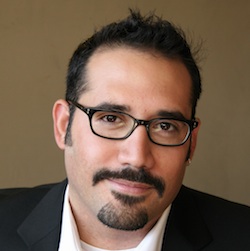 Editor’s Note: We’re wrapping up 2011 by asking some of the smartest people in journalism what the new year will bring.
Editor’s Note: We’re wrapping up 2011 by asking some of the smartest people in journalism what the new year will bring.
Next up is multimedia journalist Robert Hernandez, aka WebJournalist, currently an assistant professor at USC Annenberg.
Granted, this will make for a weak lede, but allow me to start this piece with a disclosure: I, like many of you, am not a fan of prediction posts.
Typically, they aren’t based on anything real and are often used to make grand statements we all roll our eyes at… and don’t get me started on how often they’re wrong.
That aside, here’s another piece to roll your eyes at.
 But here’s a tweak, this is not really a prediction… this is, to be honest, more of a hopeful wish.
But here’s a tweak, this is not really a prediction… this is, to be honest, more of a hopeful wish.
Okay, ready? Here goes.
We know that Content is King. There is no doubting this concept. If you don’t have ‘it,’ no one is going to engage with you.
We know that Distribution is Queen. In this modern age, what’s the point of having ‘it’ if no one will find it?
My prediction is that this ruling monarchy will be augmented by… a prince. Perhaps a duke? Whatever. And it’s called Credibility.
In the age that we live in, content is relatively cheap. Anyone can create it. If not through their computer, everyone’s phone can basically do live shots, record newsworthy sound clips and file stories. Some can do interactive 360 videos or augmented reality presentations. Really cool stuff.
And everyone can distribute their content in 140 characters, their own livestream network or their blog (how traditional).
With technology empowering everyone with the ability to create and to distribute, I predict — and wish — that in 2012 the new dominating factor will be Credibility. Actually, earned Credibility.
What will stand out from the sea of content will be the voices we turn to time and time again. Trusted sources of news and information will transcend their mastheads and company brands…and become their own brand. Brands that are solely based on being known for the quality and reliability of their work.
Just to make Gene Weingarten angry, brands brands brands brands brands. Look, that’s all marketing speak for the most important quality journalists have to offer: Credibility.
 And, sure, some of us get a head start by being associated with the Washington Post, NPR, CNN, etc. But I predict — hope — that in the coming year, individual journalists will be valued more than their distribution companies. More than the media format of their story.
And, sure, some of us get a head start by being associated with the Washington Post, NPR, CNN, etc. But I predict — hope — that in the coming year, individual journalists will be valued more than their distribution companies. More than the media format of their story.
Judged by the content of their character. (Wait, that’s a different dream.)
Many news consumers are tired of the political left and the political right fighting, and making journalism — or I should actually say “journalism” — the fight’s platform. Hell, I’m tired of it, too.
We want people who will cut through the spin and tell us what’s going on, how it will affect us and what can we do about it. We want transparent news. We want news that, while it may not always achieve that goal, honestly strives to be objective.
We want to trust journalism. And to do so, we need to trust journalists.
And bypassing the blogger-vs-tweeter-vs-media company-vs-journalist debate, it is going to come down to one thing: Credibility.
Can I reliably trust you to tell me what is going on? If the answer is yes, then I don’t care if you work out of a newsroom or out of your garage.
Let’s see what the new year brings, but that is my predication…that is my wish.
Okay, roll your eyes. Or post a comment. Share your thoughts.
Correction: We initially listed Richard, rather than Robert, Hernandez as the author of this post. We deeply regret the error, and want to stress that it’s the R. Hernandez of USC, rather than the R. Hernandez of Berkeley, who wrote this prediction. Apologies to both.
Image by vagawi used under a Creative Commons license.